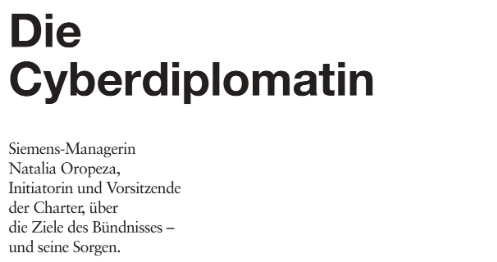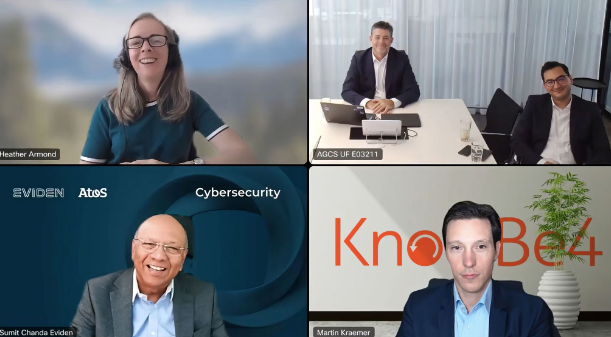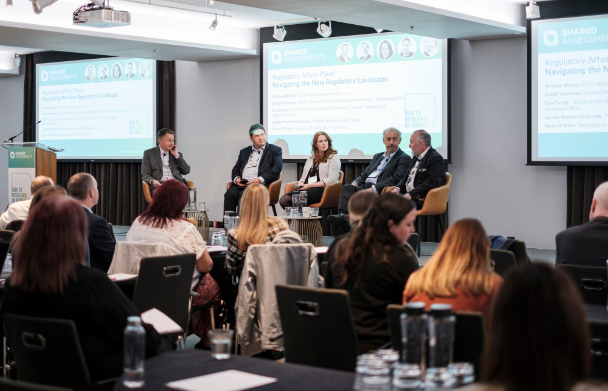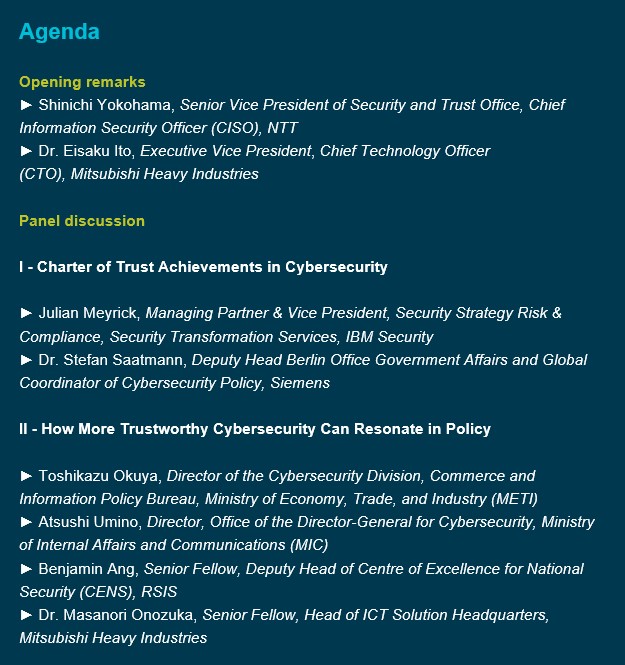On October 13th, over 200 attendees dialled in from Asia and around the Globe for the Charter of Trust Tokyo Virtual Roadshow: “How the industry is reshaping cybersecurity in our connected world”, an event hosted by Mitsubishi Heavy Industries and NTT.
Shinichi Yokohama, Chief Information Security Officer (CISO) of NTT and Dr. Eisaku Ito, Chief Technology Officer (CTO) of Mitsubishi Heavy Industries opened by highlighting the impact of the pandemic: “We have seen an increased decoupling of movement of goods, services and people paralleled by a surge in online communications, making trust-based communication matter all the more today”. Mr. Yokohama advocated for a collective emphasis on detection and response – a considerable but necessary paradigm shift given that a perfect protection is no longer possible. That is why Charter of Trust establishes Trust through people and processes.
Julian Meyrick, Vice President at IBM Security and Dr. Stefan Saatmann, Global Coordinator of Cybersecurity Policy at Siemens provided the audience with an introduction into the Charter of Trust’s vision and activities. They outlined the Charter of Trust’s 10 principles and its global collaborations with government agencies and research institutes, notably through the Associated Partners Forum.
Toshikazu Okuya, Director of the Cybersecurity Division at the Japanese Ministry of Economy, Trade, and Industry (METI) presented the advances of the Cyber-Physical Security Framework (CPSF). Atsushi Umino, Director, Office of the Director-General for Cybersecurity at the Japanese Ministry of Internal Affairs and Communications (MIC) shared Japan’s various policy initiatives on cybersecurity, from 5G to IoT, and safer teleworking measures.
Lastly, Benjamin Ang, Senior Fellow, Deputy Head of Centre of Excellence for National Security (CENS), RSIS, emphasised the importance and benefits of cross-sector information-sharing between academia, public and private sectors.
As panellists shared their insight on the state of cybersecurity regulation in Japan through the lenses of the private sector, academia and the regulators, all agreed that the fast pace of this sector requires agility from all actors.
Stay tuned for more Charter of Trust virtual events with online roadshows planned in Geneva and Madrid, as well as deep-dive webinars on the Charter of Trust Principles such as “Education,” “Security by Default,” and “Transparency and Response.”


You may also like

Chairwoman Natalia Oropeza in Brandeins Magazine
In an interview with Dorit Kowitz, Natalia dives deep into the pressing issues facing the cybersecurity landscape, explaining how the Charter of Trust bundles the expertise of different businesses across several regions to stay resilient in the face of evolving threats. As Natalia Oropeza says: "We all win if cybercrime doesn’t win."
Here are three key insights from her interview:
🔑 Collaboration is essential: No single organization can tackle cyber threats alone. The Charter of Trust is a prime example that businesses nowadays are more transparent when it comes to attacks and that sharing information in this field can be beneficial.
🔑 Addressing the digital skills gap: The Charter of Trust is working to address the global shortage of cybersecurity professionals by encouraging diversity and actively promoting opportunities for women to join the field.
🔑 Unified regulations: Harmonizing global cybersecurity standards will reduce vulnerabilities, helping businesses and governments combat threats more effectively.
The full interview is available here: https://lnkd.in/gRm6ZDGC


Cybersecurity Awareness Month
The complexity and urgency of this topic gathered a lot of interest, with 600+ attendees throughout the whole panel, which was composed of Jon-Paul Jones, COO at AZ Commercial, Firas Ben Hassan, GenAI expert & Manager of AllianzGPT at AZ Technology, Dr. Martin J. Krämer, External Security Awareness Advocate at KnowBe4, and Dr Sumit Chanda, Global CISO at Eviden & Chair of the Global External Engagement Working Group at the Charter of Trust.
We are pleased to see Dr. Sumit Chanda from Eviden bringing in his unique CISO insight on what these emerging technologies mean in day-to-day cybersecurity practices and bringing in the Charter of Trust perspective on this topic as well.
Thank you, Ervin Cihan and Haydn Griffiths for inviting other CoT Partners and for the great initiatives that Allianz is putting together within this year’s Security Awareness Month. And special thanks to Heather Armond for the great moderation.


UK/EU Summit - “Risk to Resilience”
💡Under the theme “Risk to Resilience” the first event of this series was held in London and brought together professionals from different industries and regions. Detlef participated in the panel about the complex regulatory landscape and emphasized that new legislation like the EU AI Act, DORA and Hashtag#NIS2 continue to push the standard of care on cybersecurity and other risks.
Thanks to Shared Assessments for organizing such an amazing event and inviting the Charter of Trust to participate in this high-class panel alongside Andrew Moyad, CEO at Shared Assessments.




